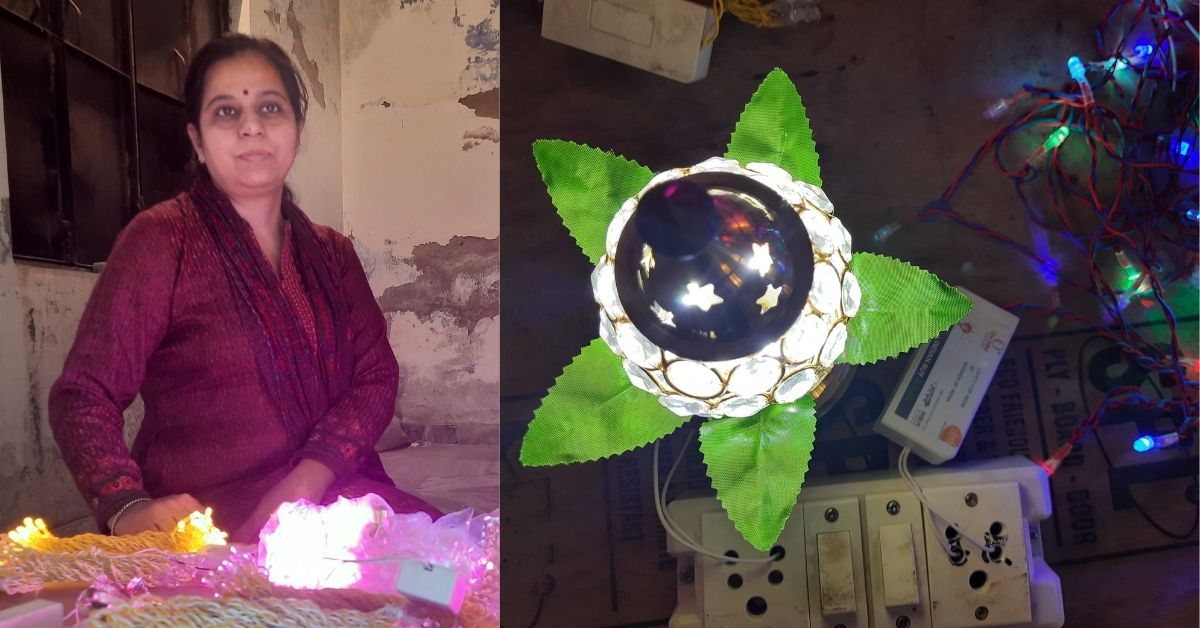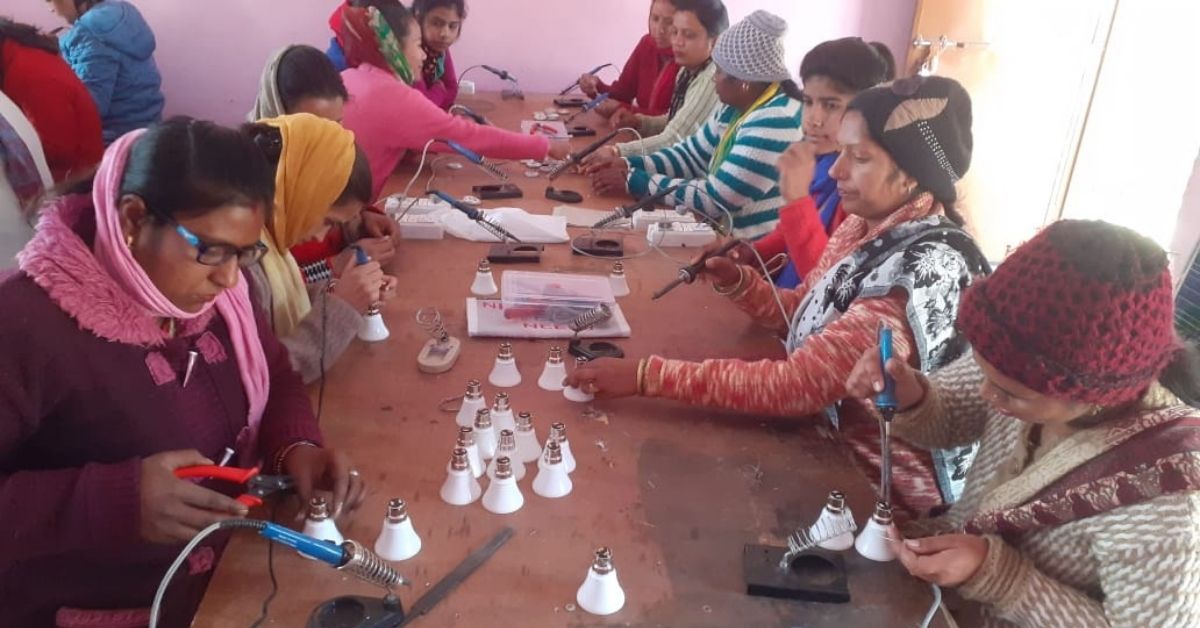(Featured image by Varsha Singh)
In Uttarakhand’s Dhakrani village, 32-year-old Farzana says she has witnessed a gradual, but inspiring transformation of rural women in dire financial conditions, who have now turned self-reliant.
Farzana, an Internal Community Resource Person (ICRP) for the National Rural Livelihoods Mission (NRLM) since 2014, is in charge of a cluster of 20-odd Self Help Groups (SHGs), comprising 10 women each, in Vikasnagar block of Dehradun.
Among the various skill development programmes these women have been exposed to, she says, one stands out for its novel take of introducing them to a traditionally male-centric domain.
Close to 50 women from her own village have not only crafted their own LED bulbs and string lights, but also made collective sales as high as Rs 70,000 during Diwali last year, she notes.
“Right before the first COVID-19 lockdown, a training session on electronics had caught my eye. We had women undergo training for a month, but it wasn’t easy for them to pick up the lessons. They had hardly ever stepped out of their homes, let alone learned the intricacies of electrical work. But after two years, they stand tall and are capable of leading training sessions themselves,” says Farzana.
While she was part of the training session herself, she says her interest lies in marketing the women’s finished products. “It was only after the lockdown eased that we could make our first sales at an exhibition in Dehradun, pricing each LED bulb at Rs 80. We started setting up stalls at block-level markets, but soon realised that the demand is much higher during the festive season. Last year, we made our biggest profits by selling almost a thousand LED bulbs, and it’s all thanks to Kamalpreet didi,” she smiles.
Farzana is referring to Dehradun-based Kamalpreet Kaur (42), who has enabled hundreds of women from rural and semi-urban areas of Doiwala, Vikasnagar, Sahaspu, Kalsi and Raipur blocks to become electrical entrepreneurs.
The BCom and MBA graduate, who became a mother at 22, always harboured a dream of becoming an industrialist. But it wasn’t until 2016, when she secured a loan of Rs 20 lakh under the Prime Minister’s Employment Generation Programme (PMEGP), that she fulfilled her aspirations with Ora Infini.
The MSME venture, focused on promoting the usage of renewable energies, has designed and developed several LED and solar-powered lighting equipment, as well as a hybrid electric bicycle. Most of their LED lights, however, are manufactured by women in the district — a majority of whom are homemakers.
Kamalpreet, along with her husband Rajeev Singh (49) and the six-member technical team at her eco-friendly startup, provides these women with free training sessions that are conducted on a needs-based basis for anywhere between 10 days and three months.

‘We’ve come a long way’
“It was officials at the Dehradun Industrial Department who recommended I apply for the PMEGP subsidy scheme. Initially, the (bank) committee wasn’t convinced I could pull off an LED business without a technical background, but I, too, was stubborn. I was already familiar with the basics because my husband is an electrical engineer, and I’d taught myself everything else I needed to know from the internet. But I told them the primary qualification I had was being a woman. We can manage everything, and if they gave me a shot I could bring several others into the business. Now, I can proudly say that more than 3,000 women from Dehradun have accompanied me in my journey,” Kamalpreet tells The Better India.
She says that by not opting for a woman-oriented business, she has been able to help revive the lighting industry in Dehradun by furthering the sale of homegrown LED lights.
“There was a time when Dehradun used to be a hub of lights. Our manufacturers supplied everything, from torches to miniature bulbs and string lights, all over India. But their business essentially disappeared when cheaper, foreign-made LED lights took over the market,” she notes.
“At the same time, I couldn’t ignore the prevalence of unemployment and wanted to create a platform that could empower women, especially those from rural communities. Most of them don’t have strong educational backgrounds, but even if they do, their circumstances require them to stay at home. LED lights were an attractive way to lure them into business, but my main motive was to have them develop basic technical knowledge and skills that they could carry forward while dealing with other electronics,” she says.
Her venture, though, began at home with the daughters of a few domestic workers in her neighbourhood.
“Every day after my house-help’s daughter got done with school, she used to come home to help her mother wash our utensils. I asked her if she’d be interested in LED lessons and told her I’d pay her for every bulb we made together. Gradually, I convinced a few more teenagers to join us. But back then, we made use of SMT (surface mount technology) machines. I realised I could create employment opportunities with a labour-intensive model and began approaching NRLM officers to access their network of SHGs,” she explains.
It was sometime in 2017 that Kamalpreet first collaborated with SHGs from Teliwala village in Doiwala block. But she was met with a fair share of resistance from the women who didn’t feel confident in their abilities to pursue electrical work.
“We used to go door-to-door to encourage women to join our training sessions, but they had never heard of anything like it before. Then, my husband suggested asking them to bring their mixer grinders, induction cookers and irons to us for repair. Once they came to us, we handed them a screwdriver and asked them to get to work themselves,” she recalls.
“The idea was to familiarise them with the tools. Gradually, we were able to convince them to turn up for the training sessions where we taught them soldering, PCB mounting and attaching wires to create strings, in addition to the basics of electronics and safety practices. We held their hands as they made the LED bulbs, the same way you teach children to write. It’s not something that they learnt in an hour, but their joy of holding a product they’d made themselves was unparalleled,” she says.
Kamalpreet points out that training sessions are usually sponsored by governmental initiatives such as the NRLM and the National Institute of Entrepreneurship and Small Business Development (NIESBUD). Other times though, when they’re approached by SHGs themselves, they make use of Ora Infini’s revenue to supply the raw materials.
In 2016, Kamalpreet also set up her startup’s factory in Dehradun with technical support from her husband, who had quit his corporate job to help out with her venture. Besides manufacturing a wide range of renewable products, the team helps market the LED bulbs and string lights made by these women.
“There was already the misconception that these women couldn’t be successful in the LED business. But even with their finished products in hand, customers were hesitant to invest in products made by homemakers. By conducting quality checks at Ora Infini, we could assure that they were investing in a product with warranty,” she says.
“But a majority of them are now adept enough to run independent businesses and don’t require handholding support from us. We’ve somehow managed to create our own competitors,” she’s quick to add with a laugh.
For instance, Kavita Pal (36), the president of an SHG in Doiwala town, says the women she works with specialise in making decorative string lights, a skill they picked up during a month-long training session in 2020. Ranging from nine to 100 m, priced at Rs 150 to Rs 1,600, respectively, she says their lights are a hit during festive and wedding seasons.
“We keep getting custom orders from families and hotels, as well as the municipal corporation for Independence Day and Republic Day celebrations,” she says, adding that the homemakers typically work a couple of hours every day after finishing their domestic duties.
“They don’t have to wait for their husbands to be in a good mood before asking them for money anymore. From never having worked to earning about Rs 25,000 per order, these women have come a long way,” she smiles.

‘No foreign lights for 2 years’
Kamalpreet says that her team has also been able to provide training to as many as 80 inmates at the Dehradun district jail, who primarily manufacture LED streetlights, after being approached by the prison in charge at a governmental fair in 2016.
“Initially, no organiser was willing to give us a spot; they kept asking us what category we’d fit into. But I pointed out how our LED bulbs were also handmade and provide a source of livelihood, much like the handicraft and food items at the fair. We were supported by the Uttarakhand Khadi And Village Industries Board and eventually got in. In fact, Ora Infini is the first electronic brand to be registered as a Khadi product,” she claims.
“People might not recognise me, but my work speaks for itself. With a network of 40 dealers and access to government supply chains, we’ve been able to ensure that the local markets haven’t had foreign-manufactured LED lights for two years now. But my biggest achievement is being able to introduce women, from 18 to 75 years of age to skills they’d never known before. Even if some of them aren’t entrepreneurs, they can now fix their home electronics themselves,” she gleams.
For further information, you can contact Ora Infini here.
No comments:
Post a Comment